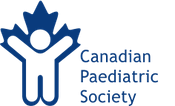To support healthy child development, doctors must support parents too
OTTAWA – When it comes to children’s social and emotional development, perhaps nothing matters more than healthy relationships – especially the ones with their parents. That’s why the Canadian Paediatric Society is advising paediatricians and family physicians to help parents cope with the inevitable challenges that come with parenting.
In a new statement released this week, the CPS recommends that physicians regularly ask parents about relationships, routines, and family function. Having these conversations routinely builds trust and helps parents feel more comfortable talking about challenges. “We know that parents struggle with these issues, but they may not know how to make things better,” said Dr. Andrea Feller, a member of the CPS Early Years Task Force. “Physicians can help parents have the kind of relationships they want with their children and babies.”
This is the first time the CPS is actively encouraging clinicians to broach difficult, sometimes uncomfortable topics – such as trauma and other social determinants of health – with parents. Three issues that parents commonly look to physicians for advice on – crying, sleep, and challenging behaviours – offer a launching point for these conversations.
Dr. Feller says that parents are grateful to have these conversations. “There are many factors that can put kids at risk for developmental problems, including parenting,” said Dr. Feller. “Fortunately, parenting is the most modifiable risk factor. Primary care providers are in an ideal position to give families the tools and information they need to thrive.”
The statement also highlights the importance of connecting with community supports – a list of which can be found here.
To promote positive parenting behaviours, the CPS recommends that clinicians:
- Ask about protective parenting factors (e.g. consistent caregiver, healthy routines) at every visit
- Build on families’ strengths and positively reinforce improvements
- Focus on issues that can be changed (e.g. reframe challenging behaviours to help parents feel more patient; manage expectations around age-appropriate behaviours)
- Model attachment-based communication skills, by being open, predictable, kind and curious
- Ask about parents’ early experiences – opening up a conversation about adverse childhood events can be a doorway to intervention
- Encourage positive discipline – guidance that teaches children appropriate behaviours rather than punishing inappropriate behaviours
- Incorporate family-friendly hours and proactive scheduling into their practice
-30-
About the Canadian Paediatric Society
The Canadian Paediatric Society is a national advocacy association that promotes the health needs of children and youth. Founded in 1922, the CPS represents more than 3,300 paediatricians, paediatric subspecialists and other child health professionals across Canada.
Last updated: Apr 24, 2019
